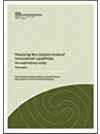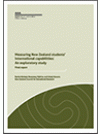This exploratory study considers the feasibility of measuring New Zealand senior secondary (Years 12/13) students' "international capabilities". Building on background work undertaken by the Ministry's International Division, the methodology had three components. Analysis of New Zealand and international literature pertinent to assessment of international capabilities was undertaken. Small-group workshops were conducted with 13 secondary school staff, 21 senior secondary students, and 10 professionals with relevant expertise and perspectives about expression of international capabilities in post-school life. The third component was a visit to the Australian Council for Educational Research (ACER) to discuss similar assessment challenges in their work.
Purpose
Measuring New Zealand students’ international capabilities could help us to better understand how the schooling system helps to “increase New Zealanders’ knowledge and skills to operate effectively across cultures.” It could feed into ongoing developments within educational policy and practice to better align curriculum, assessment, and pedagogy with the high-level goals of The New Zealand Curriculum. Looking further into the future, knowledge about how our schools support the development of students’ international capabilities could assist with longer-term redesign of educational policy, curriculum, assessment, and qualifications to keep pace as demands and pressures on learning and schooling continue to change through the 21st century.


